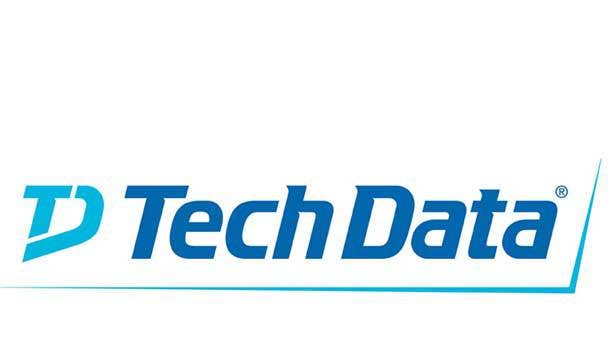Tech Data's Rich Hume On Distributor's Role In The Cloud And IoT: Exclusive

The New Economy Is Driving New Growth
When Tech Data early this month reported its fourth fiscal quarter and full fiscal year 2019 financials, everything looked pretty good, including operating income, EPS growth, and revenue growth. For investors, however, the loudest part of the financial report was the unveiling of first quarter 2020 expectations that fell slightly below analysts' expectations, leading to a sell-off of the company's shares, which recovered slightly the following day.
Rich Hume, Tech Data CEO, told CRN in an exclusive conversation that he expects fiscal 2020, which started Feb. 1, to be a good year as the distributor's offerings related to digital transformation, such strategic areas as cloud, security, analytics, IoT, and services, become drivers not only of growth for Tech Data but also for the platforms on which solution providers can meet compelling customer requirements.
For a look at how Tech Data will help partners drive new business in 2019, click the slideshow.

Why did Tech Data lower its guidance for the first fiscal quarter of 2020?
A couple things. Number one is, [for] Q4 and the full year, we had outstanding results when you look at operating income, EPS (earnings per share) growth, revenue growth, all of the above have had a really strong outcome. And second, we provided some very strong guidance for the full year next year, saying that our operating income growth will be in mid-single digits and that our earnings-per-share growth will be approximately 10 percent. And then, on top of that, we said that we are actually incrementing our share repurchase program by another $100 million. So there's, in the rounding, $200 million of share repurchase in front of us that should actually improve that approximate 10-percent earnings-per-share growth.

So why do you think the investors reacted so negatively on Thursday?
What I think the market is reacting to is, the guidance in the first quarter was lower than the guidance of the analyst community. That's my speculation on what they were responding to.
A couple things. Q1 is typically our smallest quarter of the year. And its one of the usually more challenging for us, given the size. That's a piece of it. Secondly, we've got really good confidence in the full year ahead, and I think that if we are to be judged on those metrics that they would be considered very reasonable and solid.
OK, let's see if the analysts agree with that later...
The upside, though, is you get a knee-jerk reaction. And then as the rest of the analysis is complete, there's perhaps a bit of an adjustment to the view.

You mentioned optimism for the upcoming year. What factors are you seeing that give you optimism?
First, we'd like to reflect on the 2018 calendar year, our fiscal 2019. It has been a really, really strong [IT] industry. I think the last time we were together, I was telling you that it didn't really matter which geographic area or which category, be it PCs, servers, data centers, storage, and all the things that go with it, etc. My view is that, if you look into the coming year, call it calendar '19, there's healthy growth, but not at the same pace that we have seen in calendar '18. I think I've been quoted before in saying that, in my decades in tech, it was one of the strongest years that I have witnessed. So despite the fact that 2019 is going to be strong, when you compare it to 2018, [it will be] strong, but not quite as strong.

What product areas in particular are you seeing optimism?
Now, when we get into what we believe are the growth categories, we all have different sources that we use to measure the tone of the industry. I think the top-level story is, digital transformation and all of the pieces that go along with that are quite strong as basically the entire world transforms. Big data and analytics are a part of digital transformation, so surely they fit within that fold. And then the strategic areas that we're focused on around cloud, security, analytics, IoT, and services are where the predominance of the growth are within the market. I would say that, in summary, [it's] a healthy market overall, not quite as accelerated as last year. Within the healthy market, digital transformation [is] a big driver[with] some of the sub-categories around digital transformation of analytics, IoT, as well as the cloud and security, being pervasive everywhere.

You mentioned as growth drivers cloud, security, analytics, IoT, and services. If you combine them together, they make up how big a part of Tech Data's overall business?
We don't lay out all the puts and takes within our portfolio. I can tell you that they are the fastest-growing segments within our portfolio. You can certainly think of it as a multi-billion-dollar business overall. In the last earnings [call], we talked a little bit about our cloud billings being at an annualized run rate of around a billion dollars, with a pretty good growth trajectory. So that one we do highlight. The growth rates within that category are very strong double-digit growth rates.

For the big data, analytics, and IoT businesses, what kind of growth are you seeing from your channel partners?
As new technologies work out, the first-of-a-kinds are done by vendors in large enterprise accounts. And then, over time, those offerings get packaged and then they're scaled into the broader market. And that's where the channel comes in, when those things are scaled into the broader market. And certainly, when you get around the discussion of big data and analytics, my opinion is, we're at that cross-over point right now, where there's really going to be good growth at those things within the channel.

How about security and the cloud?
[Security has] been somewhat of a fragmented market from a vendor perspective. But that adds solid growth for all of the channel partners who decide that security is a focused practice for them. And we see more and more making the investment to build their security practices. And then, for any data center partner, as we move through time, if they aren't taking on a hybrid cloud approach, and offering their clients both on-prem and off-prem opportunities based on specific needs, then they're missing a big opportunity because it's undeniable that workloads are moving into the off-prem cloud. And, in order for data center partners to have successful engagements, they really need to have a hybrid value proposition to take to their customers.

When it comes to new technologies like IoT, analytics, and big data, are you seeing more interest from Tech Data's existing channel partners or from new channel partners?
Both, almost equally. Most data center partners are engaged with big data in one form or fashion. As it relates to analytics in particular, or to the software side of the whole big data scene, there's a bit of a slower transition there from, I'll call it, the existing partner base, and a bigger uptake with new partner types. But big data, very pervasive. Analytics, some of the partner base [is] coming on, and new partner entrants as well. My belief around analytics is, back when that whole charge had started to emerge, you had the first-of-a-kinds out of the large vendors first in large enterprises. And now we're going to see these analytics solutions be packaged [to be] more scalable and easily deployed. And we're going to see an increase, in my opinion, within the DTAM (distributor total available market) around analytics and IoT over the next couple of years.

We're seeing a huge push by the vendor and channel communities into the MSP business, especially for SMB customers. What are you seeing from the distribution side?
The MSPs are becoming a much bigger part of the channel. The second thing I would tell you is that, as we move more towards new technologies, they're becoming more important. And oh, by the way, a lot of the existing partner base taking on the new technologies have been becoming MSPs themselves. So we see emerging MSPs, we see legacy MSPs, and we see a lot of the existing channel take on that role.

What has Tech Data done to make it easy for MSPs to take on those new technologies?
A couple weeks back, we announced Tech Data's Cloud Solutions Factory. And within the Cloud Solutions Factory, we're packaging offerings on the cloud, for example, Small Business Cloud Server [on Microsoft Azure]. Another one would be NetApp with Microsoft Azure that we're pre-configuring. A third would be Red Hat OpenShift with Azure. There's room now for the distributor to carry out a lot of the hard work of integrating solutions and then making those packages available for easier consumption to resellers. And, oh, by the way, there's a bigger take-up by the managed service providers with those types of packaged offerings.[This] allows distribution to bring more value to the equation by doing the engineering and some of the development required to pull those things together.
We have integration centers today where we physically integrate things, and test them, and put them out there. This is the same integration effort, but it's in the virtual world.